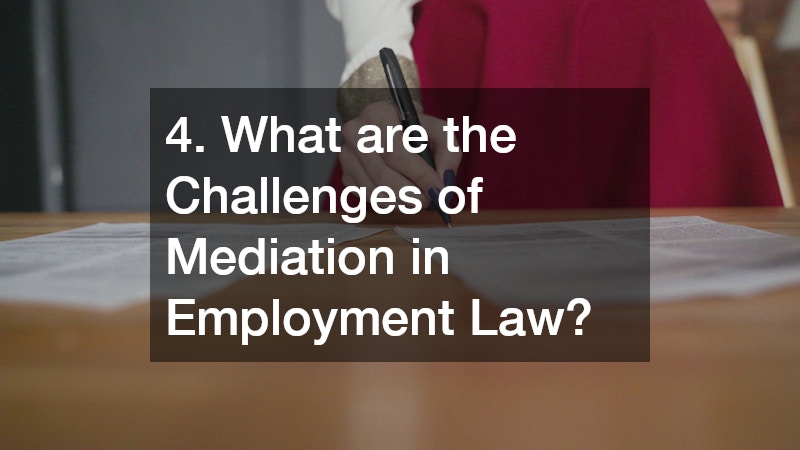Understanding the nuances of mediation employment law is crucial for business owners aiming to foster a positive workplace and avoid costly disputes. Let’s delve into how mediation can serve as a valuable tool for employment law management.
1. What is Mediation in Employment Law?
1.1 Definition and Purpose
Mediation is a process through which an impartial third party assists disputing parties in reaching a mutually acceptable agreement. It is utilized in employment law to resolve conflicts efficiently and amicably, often leading to more sustainable outcomes than adversarial litigation.
The purpose of mediation is to provide a confidential and informal environment where parties can openly discuss their concerns and interests. This contrasts with the public scrutiny and rigid procedures of court-based litigation, which can further strain workplace relationships.
Mediation encourages voluntary participation and collaboration towards a common goal, making it a valuable tool in employment law. By focusing on interest-based negotiations, mediation helps address the underlying issues that courts may overlook.
1.2 Benefits over Litigation
Mediation offers numerous advantages over traditional litigation, including lower costs and shorter resolution times. Business owners often find mediation to be a less adversarial approach, reducing hostility and encouraging ongoing relationships.
Litigation can be financially draining and time-consuming for businesses, especially small to medium-sized enterprises. Mediation, on the other hand, allows for a more streamlined and focused process, avoiding the extended delays often associated with court proceedings.
Moreover, mediation provides the flexibility for creative solutions that are not bound by legal precedents. This can be particularly advantageous in employment disputes, where tailored agreements can better meet the needs of all parties involved.
2. How Does Mediation Impact Employer-Employee Relationships?
2.1 Enhancing Communication
Mediation serves as a platform for open communication, allowing employees and employers to express their concerns without the fear of immediate retaliation. By facilitating dialogue, mediation can uncover misunderstandings and align both parties towards common objectives.
When communication breakdowns occur, they often escalate into larger conflicts that affect morale and productivity. Through mediation, these breakdowns can be addressed proactively, preventing disputes from festering and disrupting the work environment.
Furthermore, the process empowers employees by validating their perspectives and fostering a culture of inclusivity and respect. This empowerment often leads to improved job satisfaction and engagement, as employees feel heard and valued by their employers.
2.2 Building Trust and Cooperation
Trust and cooperation are key components of a healthy workplace, and mediation plays a vital role in nurturing these aspects. By resolving conflicts constructively, mediation bolsters mutual respect and reinforces team cohesion.
The mediation process encourages transparency, which can diminish suspicions and build confidence between the employer and employee. This foundation of trust is essential for long-term collaboration and organizational success.
As business owners witness the positive changes in workplace dynamics post-mediation, they are more likely to adopt proactive conflict resolution practices. A culture of trust and cooperation is thus cultivated, benefiting both the organization and its employees.
3. What are the Legal Frameworks Supporting Mediation?
3.1 Relevant Employment Laws
Various employment laws support and regulate mediation, ensuring it is conducted fairly and effectively. Laws such as the Employment Dispute Resolution Act provide the legal basis for mediation practices, reinforcing their legitimacy.
Depending on the jurisdiction, employers may be obligated to offer mediation before pursuing litigation. These legal frameworks promote mediation as a preferred method for dispute resolution, aligning with broader judicial reform efforts to reduce court caseloads.
Furthermore, laws mandate confidentiality in mediation proceedings to encourage open dialogue and protect the interests of both parties. This legal protection is paramount for instilling trust in the mediation process and ensuring its integrity.
3.2 Compliance and Implementation
Business owners must acquaint themselves with relevant laws to successfully implement mediation strategies. Compliance involves understanding both federal and state regulations that govern mediation proceedings within their industry.
To implement mediation effectively, organizations should establish clear guidelines and policies that outline the mediation process. This includes choosing qualified mediators, ensuring confidentiality, and setting realistic timelines for resolution.
By investing in training and resources, businesses can enhance their internal mediation capabilities and comply with legal obligations. Proactive measures ensure that mediation is not only a compliance tool but also part of an overarching strategy for workplace harmony.
4. What are the Challenges of Mediation in Employment Law?
4.1 Common Barriers in Mediation
Despite its advantages, mediation can present challenges such as power imbalances and biases, which may hinder fair outcomes. Identifying and addressing these barriers is critical for a successful mediation process.
Employees may fear retaliation or mistrust the process, potentially impacting their willingness to participate. Additionally, employers may be reluctant to engage in discussions perceived as undermining managerial authority.
Organizational culture and previous experiences with conflict resolution also contribute to mediation barriers. Overcoming these challenges requires careful consideration and adaptation of mediation strategies to meet the unique needs of the organization.
4.2 Overcoming Obstacles
Effective training and clear communication can help overcome common obstacles in the mediation process. Ensuring both parties are well-informed about the benefits and protocols can alleviate fears and promote engagement.
Using skilled and impartial mediators is crucial to maintaining a fair and balanced process. Mediators adept at recognizing and mitigating power imbalances can guide discussions towards equitable resolutions.
Employers should foster a culture of openness and respect, where mediation is viewed as a constructive and non-threatening option. Focusing on collaborative problem-solving can transform mediation from a reactive measure to a proactive strategy.


